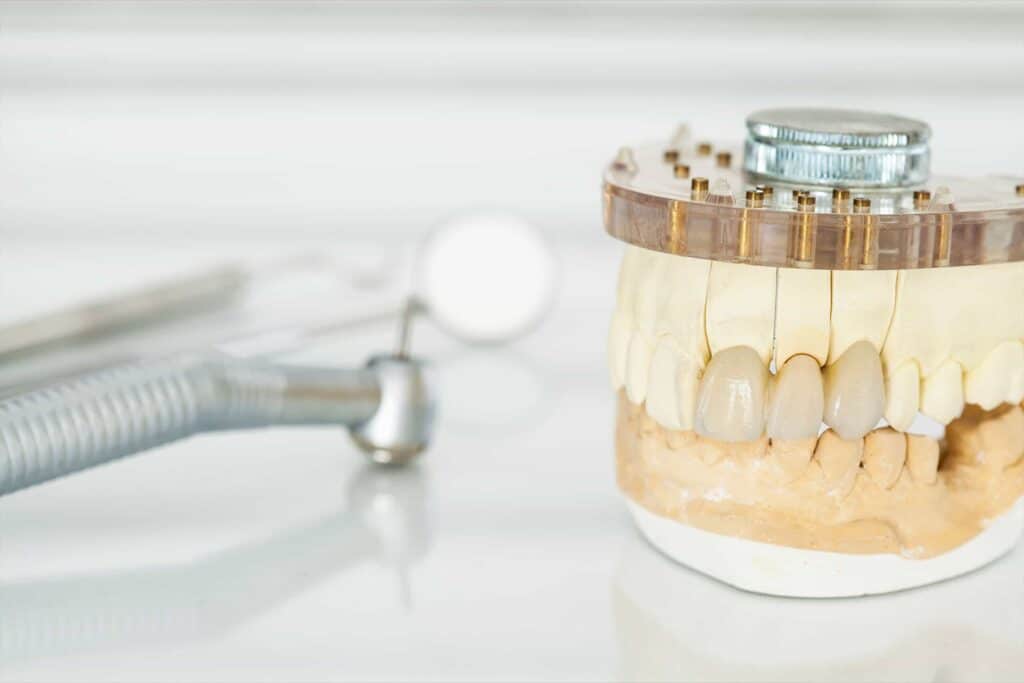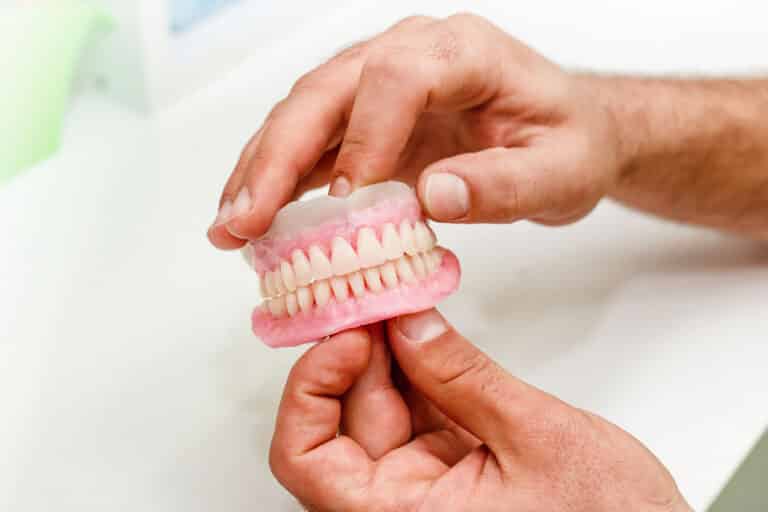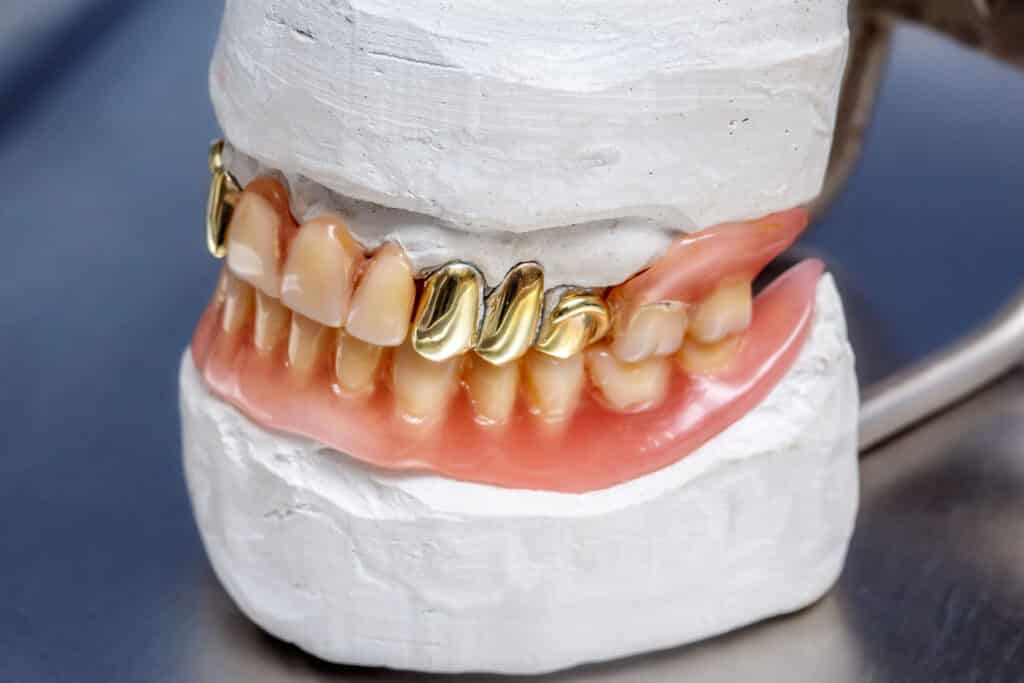Though many people are unsure what it is, bruxism is relatively common. Bruxism is a condition in which you consciously or unconsciously grind your teeth. Teeth grinding may occur when fully awake but mostly happens during sleep.
Bruxism can be frustrating and indicate something more serious, like some sleep disorders. In some cases, mild bruxism will not require medical treatment or at the most some type of a night time appliance such as a night guard. However, those who suffer from extreme occurrences will often have unrelenting symptoms that interfere with daily life.
This article aims to educate you all about bruxism, from causes to potential dental problems that stem from the condition.
What Causes Bruxism?
It’s difficult for doctors and dental professionals to pinpoint exactly what causes people to grind their teeth, as it can differ from person to person. However, it’s thought that teeth grinding is a combination of stress, genetic, physical, social, and psychological factors.
When awake, bruxism can stem from emotions like anxiety, anger, frustration, stress, or tension. It could very well be a coping strategy for high-stress situations or a habit you’ve unknowingly developed during periods of deep concentration. People may also grind their teeth in response to physical stress, such as moving or lifting heavy objects.
If you grind your teeth while asleep, it also could be associated with arousal during your sleep cycle. Sleep bruxism raises a few red flags, and is thought to be a compensatory mechanism for a sleep disorder, such as obstructive sleep apnea.
If a patient experiences unexplained teeth grinding, sleep tests or other examinations may be in order. Here are a few factors that might put you at a higher risk of experiencing bruxism.
What are the Risk Factors of Teeth Grinding?
There are many factors that play into the likelihood of teeth grinding, both during the day and at night. It is likely that no single factor is the cause of bruxism as more research is needed to find out the causes. However here are a handful of risk factors that increase the odds of teeth grinding.
Stress and Anxiety
Numerous factors play into a person’s amount of anxiety. These may play a role in nighttime clenching and grinding.
Age
Nighttime teeth grinding tends to be common among children1https://www.nature.com/articles/sj.bdj.2018.757. As children get older, the prevalence of sleep bruxism tends to reduce2https://www.mdpi.com/1660-4601/18/18/9544.
Genetics
If your parents grind their teeth, you may also grind your teeth more. Genetics plays such a huge role in determining who we are and how we behave. Therefore genetics should play a role in the prevalence of teeth grinding bruxism.
Drugs and Medications
Substances such as psychiatric medications, tobacco, copious amounts of caffeine or alcohol, and recreational drugs may be related to sleep bruxism.
Mental Health and Medical Disorders
Factors such as epilepsy, GERD, dementia, ADHD, sleep apnea, and night terrors all may have a relationship with teeth grinding.
It is important to understand that although these factors may be related to teeth grinding, they may not have a direct cause-and-effect relationship. For instance, it would be difficult to say confidently that if you have GERD, you’ll also be grinding your teeth.
What Are The Problems Of Bruxism?
Many issues come along with bruxism and none are very enjoyable for the patient. There are short-term and long-term problems that can arise when you clench and grind. However, complications tend to take a while to manifest into significant problems.
Damage to the Teeth
Fractures and trauma are common with people who grind their teeth. Not only are you at risk of breaking your teeth, but also any dental crowns, dental fillings, or even dental implants are at increased risk. The constant overuse increases the risk of tooth damage.
Temporomandibular Joint (TMJ) Problems
Patients may experience aching jaw pain and potential TMJ disorders from consistent clenching and grinding. Hyperactive, sore, and painful jaw muscles are amongst the most common signs and symptoms of teeth grinding and sleep bruxism.
Headaches and Facial Pain
Tension headaches are commonly seen in bruxism patients, as they often hold their jaw in a state of unrelieved tension. This heightened muscle activity can result in or exacerbate TMJ pain as well.
Severe jaw and facial pain can be a side effect of bruxism, primarily when it’s chronic. The constant activity in the jaw muscles can lead to pain. Muscles need to rest and relax and unrelenting teeth grinding would be like doing 10,000 bicep curls every day without resting. That amount of stress will eventually cause problems to any muscle.
Sleep Disorders
Even when not the direct result of a sleep disorder, sleep bruxism is thought to be sleep-related problem, specifically to obstructive sleep apnea.
The side effects of bruxism are undeniably unfavorable. When left entirely untreated, both sleep bruxism and daytime tooth grinding can lead to problematic jaw muscles and severely worn-down teeth. Eventually, those teeth will need reconstruction, possibly in the entire mouth.
Can You Get Bruxism If You’re Young?
Bruxism often is quite common in children, though it may dissipate by teenage years or adulthood. Bruxism is more typical during childhood and could be an involuntary response to daily stressors or anxiety.
Bruxism isn’t generally dangerous during childhood, though if it’s constant, there might want to be an investigation into the cause. Over time, kids can also experience headaches and jaw pain from bruxism.
What’s The Difference Between Bruxism And Teeth-Clenching?
Though clenching the teeth is a part of bruxism, it’s not exactly the same problem. Teeth clenching is when the upper jaw and lower jaw are pushed together tightly but without movement. Once the teeth start moving, while still in contact, it becomes someone grinding their teeth.
So while teeth clenching and bruxism may seem like the same thing, the biggest difference is that the teeth don’t move during clenching.
How Can I Stop Bruxism?
As of right now, there is no magic bullet to outright stop clenching and grinding. Fortunately, you can prevent and treat bruxism through various treatment methods and approaches.
Dental Options
A few dental approaches can help with bruxism, which may help with the wear to the teeth. These include the following:
- Regular dental evaluations preemptively protect weak teeth.
- A dental splint known as a night guard helps to protect the teeth during sleep. While this type of splint does not prevent sleep bruxism, it prevents the upper and lower teeth from touching to reduce the wear and tear from grinding.
- Botox injections weaken the jaw muscles, in particular the masseters. Weakening the masseters significantly reduces the bite force that is able to be generated. Keep in mind botox injections need to be regularly administered.
Behavioral Options
Behavioral and mental changes may help manage the adverse effects of teeth grinding and clenching. There are various lifestyle changes you can make that could help include:
- Managing stress and anxiety, maybe with the help of a licensed therapist or counselor.
- Behavioral changes regarding the way you hold your jaw. Your dentist may be able to help with this.
- Put self-care first, avoiding stimulating beverages or foods at night.
- Practice good sleep hygiene habits.
- See your dentist regularly for major signs and symptoms and the management of bruxism.
Medications
Medications aren’t practical for the treatment of bruxism, but there are a few medical routes which may include the following:
- Muscle relaxers may help and your doctor may suggest them for a short time before bed. You will want to speak to a sleep medicine doctor prior to these types of treatments.
- Anxiety medications or antidepressants may help with bruxism.
The best treatment will vary so it is important to speak to both your dentist and physician. It may include one or a combination of splints, behavioral modifications, or medications. The treatments will also vary for children versus adults as well. Be sure to review and consider all options as you don’t want to make your overall health worse just to make your mouth and jaws feel better.
Treating Associated Bruxism Disorders
Specific disorders are associated with bruxism, and if your doctor determines one of them to be the cause, treatment of that disorder could help you. By removing enough
- Addressing any sleep-related disorders, such as sleep apnea, can help significantly in the battle against bruxism.
- Treating underlying medical conditions with medication, such as GERD or ADHD, that prove to be a cause of chronic bruxism can eliminate symptoms and lead to relief.
The treatment for bruxism will vary based on how severe the health issues and the level of discomfort the patient experiences. People need to know that bruxism is very treatable, and if it’s making you miserable, seek help from a dental professional or doctor as soon as possible.
Was this post helpful?
References
- 1
- 2





